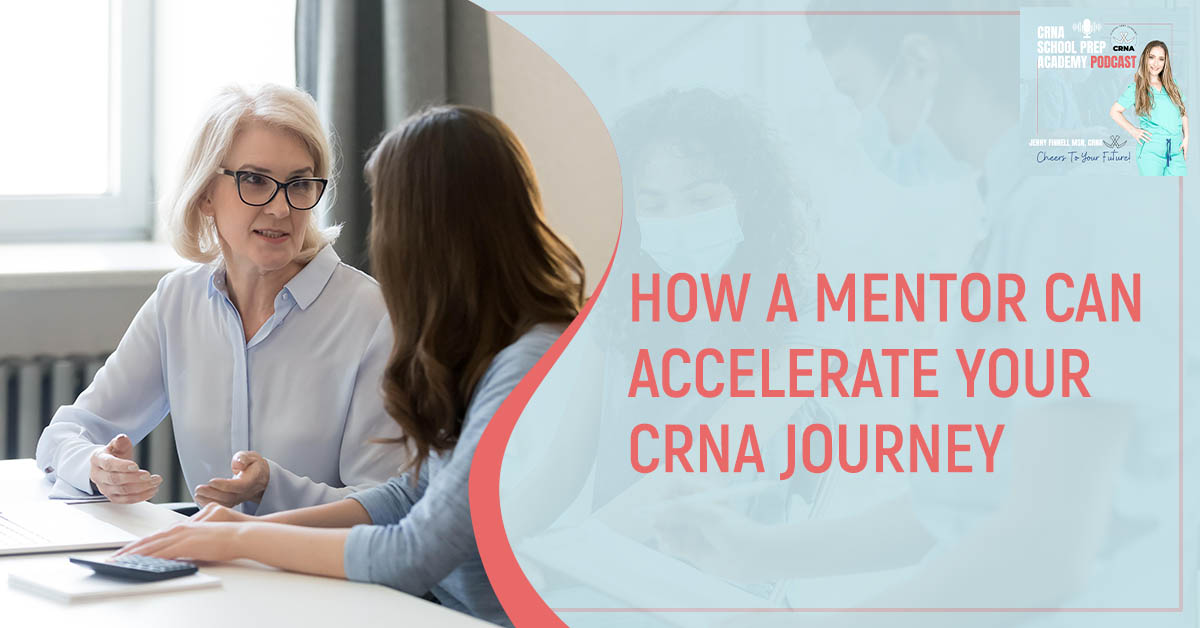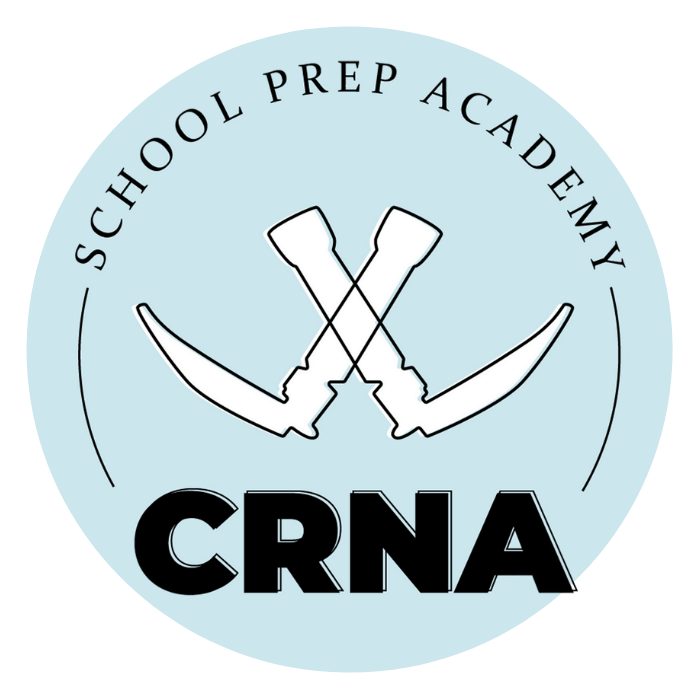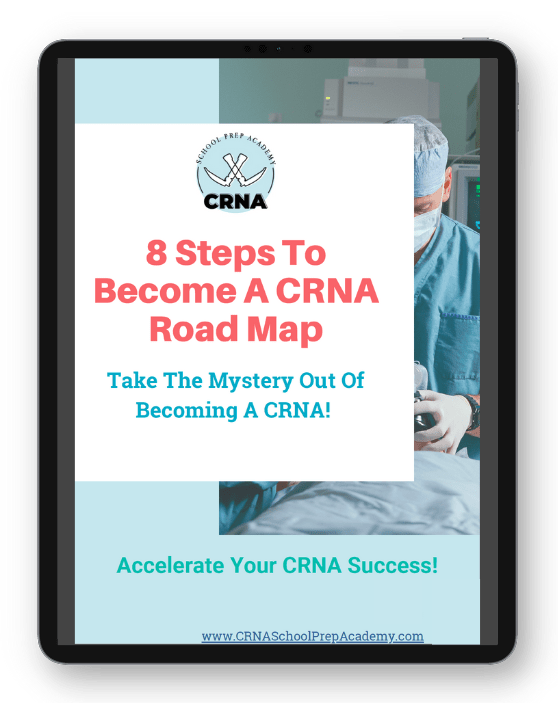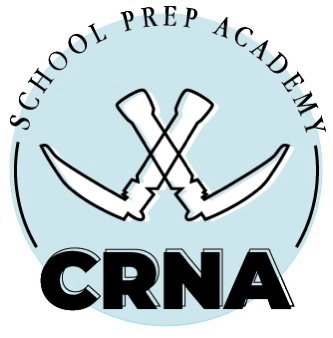
Can having a mentor accelerate your CRNA journey? The short answer is YES! The long answer is still yes but a lot more nuanced. In this quick session, Jenny Finnell discusses the reasons why mentorship is important as you embark on your CRNA journey. She talks about one-on-one mentorship, peer-to-peer mentorship, group mentorship, reverse mentorship, and the unique benefits of each. She also touches on how mentorship helps you expand your network, build better communication skills, and advance your career as a CRNA. Plus, she shares some really important updates about the CRNA School Prep Academy podcast. You don’t want to miss this!
Get access to planning tools, mock interviews, valuable CRNA Faculty guidance, and mapped-out courses that have been proven to accelerate your CRNA success! Become a member of CRNA School Prep Academy here!
https://www.crnaschoolprepacademy.com/join
Book a mock interview, personal statement critique, resume review and more at https://www.TeachRN.com
Join the CSPA email list here! https://www.cspaedu.com/podcast-email
Send Jenny an email or make a podcast request!
Hello@CRNASchoolPrepAcademy.com
—
Watch the episode here
Listen to the podcast here
How A Mentor Can Accelerate Your CRNA Journey
Can having a mentor accelerate your CRNA journey? In this episode, we’re going to discuss why mentorship is important as you embark upon your CRNA journey. I also have some important updates to share. Make sure you stay all the way to the end. Some important things are coming for CRNA School Prep Academy show and I don’t want you to miss out on those new features.
In this episode, again, we’re going to talk about mentorship and how it can play a large role in your success as you pursue CRNA. For those of you who are new to the show, welcome. I’m so grateful you found us. We’re going to talk about mentorship and at the end, I’m going to share some important updates about the show and some things that are going to be changing. Without further ado, let’s get into the topic.
A lot of us understand mentorship from a very young age but even speaking from my own experience, it can mean a lot of different things to a lot of different people. I don’t think any definition or any type of mentorship is not “mentorship,” but how they say that there are 1,000 ways to deliver an anesthetic, there are different forms of mentorship, and they’re all good and for different reasons.

It’s key when you’re thinking about mentorship to understand there is not just one form of mentorship that can allow you to be successful. In fact, the more variety that you receive as far as mentorship, the better and more engaging mentorship will be for yourself and for the mentor providing the mentorship. Let’s look at some benefits and different types of mentorship relationships.
One-On-One Mentorship
Probably the one that’s most commonly thought of is having a one-on-one mentor. Someone that you know, whether that be a family member or a friend of a family member who takes you under their wing and shares their career path or different life experiences with you. People do this in the business world all the time. It’s a pretty common and standard thing where you find what they call advisors. These advisors help you as a mentor to help fuel the success of the business.
In your career path, you find, say, a nurse who has achieved a certain goal within nursing like becoming a CRNA and you connect with them then they take you under their wing and they mentor you. That’s a traditional form of mentorship. In the past, it was usually an in-person experience or over the phone. With the birth of the internet, now a lot of things can be virtual. Again, mentorship has become probably a more commonly experienced forum being online and virtual than in person.
However, there are benefits for both. You go for an in-person shadowing experience, for example, before you become a CRNA. That experience is so vital to your journey and to building that passion and that desire to become a CRNA. It’s a step that should not ever be skipped but also connecting with a CRNA, even if that’s on a Zoom call or on the internet in some way and understanding the career path, whether they’re taking some time to make a YouTube video or whatever it may be.
Shadowing is so vital to your journey and to building the desire to become a CRNA. It’s a step that should never be skipped. Click To TweetThose are also key areas of mentorship that maybe are not direct one-on-one, that is maybe not them getting to see you face-to-face but equally important because you’re getting some insight into this career path to make better choices for yourself. That’s what it’s all about. Mentorship is about empowering you to make the best choices for you. It’s not trying to sway or push you in one direction or another.
It’s about what you need and what you want, and helping you understand even what that is. I see a lot of students who embark on the CRNA path. They don’t even know where to start. They know they want to accomplish this goal but they don’t even know where to start and what the order to do it is. They get frazzled when they think, “I have all this stuff to do but I don’t know where to start. I feel like I’m going to mess up a step or miss something.”
Again, that’s why CRNA School Prep Academy was born. Essentially also why Nurses Teach Nurses (Now called TeachRN!) was born because the power of mentorship is it allows you to accelerate your success in any area of life. It depends on what your end goal is with CRNA School Prep Academy. It’s becoming a CRNA but it may be becoming an FNP, an ICU nurse, a flight nurse, or whatever it may be. There are different goals that you have for your career.
Placing yourself in the same room with someone else who has achieved that goal is going to allow you to miss barriers, overcome hurdles, and speed up the process because now you don’t have to learn from trial and error. You still will, on occasion, have some setbacks but having a mentor or an advisor allows you to accelerate your goals in life. That’s ultimately what a mentor does.
It allows you to make good decisions for yourself that are going to fill your cup and lead you on a path of fulfillment and satisfaction. One-on-one traditional mentorship is the most common but again, that can be done virtually, in person, over the phone, or stranger to stranger. I would be honored and grateful if you consider me a mentor. I may have never met you or may not even know your name but I do care and this is receiving mentorship by plugging into the show every single week.
That is a form of mentorship that maybe isn’t a traditional form but has become more commonplace in the realm of the way we can do technology these days. That is essentially one form. The fact that maybe you’re going to someone who has experience or who has achieved a certain career goal or life experience that you also desire. It’s looking to someone who has the professional or more senior experience that can give you guidance on how they achieved it and how they got there.
Peer-To-Peer Mentorship
Now, the next type of mentorship, and again, I think most people think of mentorship as that form because they see you as a role model or you have achieved a certain goal but I also want you to think about your peers. I think back to this and this is probably the most underthought-about way of mentorship. It’s because it’s so commonplace and built-in ingrained in our daily lives that we don’t realize how important it is on who you surround yourself with on a day-to-day basis, your peer-to-peer, your friends. This is peer-to-peer mentorship.
If you surround yourself with people who have the same goals and ambitions, even if they’re not the same but are equally ambitious in their own ways, you’re more likely to be successful. You’re going to be each other’s cheerleader through the ups and downs and peaks and troughs of the journey. Peer-to-peer mentorship occurs not through osmosis but by being friends and by caring about someone else’s dreams. I also think peer-to-peer mentorship is important because it’s so relatable.
If you surround yourself with people who have the same goals or are equally ambitious in their own ways, you're more likely to be successful. Click To TweetI think back to my time as an anesthesia student going through CRNA school and coming home from a very exhausting, challenging day in clinical and probably ghost white and tired. My husband asked me to explain my day and how’d it go and all this stuff. I was like, mute. I couldn’t talk about it because I was like, “There’s too much explaining that I have to do.”
I don’t have the energy to explain but yet my fellow peers that were in class with me that were going to clinicals as well, I could open up and talk all day because they could fill in the blanks. They knew what I was experiencing. They already knew what I was going through emotionally, physically, and mentally. It was like this instant connection. They could relate to what I was experiencing because they were in the mud with me.
They were in the trenches with me and there’s something about that bond of having a similar experience and working towards the same goal of getting out of that mud that brings you together and allows you both to excel. I think of this as a buddy-buddy system or someone that isn’t literally in the same position as you yet you’re on the same path. This is also powerful.

Again, this could be a peer that is in the same nurse anesthesia program as you. This could be an ICU nurse who’s also pursuing CRNA. This could be another nurse who’s pursuing becoming acute care NP. Whatever the specialty may be, it’s finding a peer who isn’t further ahead of you but is on the same path. This is a very powerful tool because it keeps you on track.
There are going to be times where life’s going to beat you down and you’re going to wonder if you should keep pursuing this. It’s that peer-to-peer daily osmosis reinforcement that can keep you motivated to keep tackling your goals. That is why peer-to-peer mentorship is one of the most under-observed or recognized forms of mentorship but it’s there every day in your life. You just have to open your eyes and look for it, like, “I do surround myself with similar friends who have similar goals.”
If you don’t, that’s okay too. I’m not trying to make you feel bad but I also want you to start thinking, “How can I surround myself with people who are on the same path? Can I try to seek those people out?” One of the hindrances to becoming a CRNA is that a lot of you are keeping a secret. A lot of you are fearing letting your coworkers know you’re pursuing anesthesia because you’re going to be a black sheep on the unit and I get it.
There are some places that are not friendly towards CRNAs and they want to hinder you in every way possible and that’s unfortunate. I wish it wasn’t true. I would highly wish and pray that you could find a unit that was not like that, that would encourage you to chase your goals no matter what they are. You better believe there is someone else on that unit who also is hiding that secret and how will you ever know if you don’t start expanding your network and being more open about it?
I encourage you. If you can find a safe place to get to know someone and try to share some ambitions with each other, to try to find someone else, whether that’s on your unit or a different ICU unit that’s sharing the same ambition. Get to know them and become friends because you could be each other’s peer mentors along the journey.
I know you folks who have read the episodes may have heard the story but I’m going to tell it again for those of you who are reading it for the first time. How this worked for me and again, it wasn’t a way that I even probably recognized at the time because, to me, it felt so natural. These have been my friends for a very long time.
When I entered nursing school, for example. I don’t know how, probably because I spoke to it a lot and I was super excited about this career path. I was like, “I want to become a CRNA.” I used to speak that that was my goal, even though I had doubts. I was like, “I want to become a CRNA but I still have a lot of doubts.” It allowed me to meet other nursing students who are on the same path and those became my friends in nursing school, then those friends became co-workers in the ICU.
When we were all trying to get into CRNA school, we all studied together. If I found a good resource, I would share it. We would do study sessions and mock interview sessions. We were each other’s peer-to-peer mentors. We all got into CRNA school. We’re all CRNAs. One of them didn’t occur at the same time but a few years later, she got in. Again, it’s the beauty of helping one another and not seeing each other as competition because clearly, we were but knowing that your time will come. Even if it’s not this time, your time will come.
When you have a friend who’s going to back you, who will work with you. Again, my friend who didn’t get in right away, we worked with her for years and coached her on the interview process and wouldn’t let her quit. We said, “We have to keep trying.” Eventually, she got in. Again, we were backing her even though it didn’t happen at the time she wished it would have happened when all of us got in.
Group Mentorship
The next form of mentorship is group mentoring and this is something that we do inside of the CRNA School Prep Academy because I myself have been a part of a lot of group coaching programs. I’m an introvert by nature and shy. I don’t like to be in big groups of people especially groups of people that I don’t know. I tend to shut down. I tend to be quiet but not because I don’t want to communicate or participate but because I prefer listening and observing and only adding when I feel like I truly have a good value to add.
I enjoy listening to others more so than I do talking. Based on this show, you might not think that but that’s how I am in a group setting. That being said, group mentorship, while it can feel intimidating, that’s such a limiting belief and it can hinder you from your success, and here’s why. When you’re in a group setting and you do listen, the beauty of what starts to happen is you realize there are questions and certain things that you’re experiencing that other people are also experiencing.
These say a couple of things. One, it helps you not feel alone. You’re like, “I have had the same experience and it’s so frustrating.” That automatic bond of like, “I have someone who’s in my group. I have someone who’s experienced the same struggle as me. This makes me feel more human, more connected, and maybe we can tackle this together.”
The next thing it does is it brings up things that you may not have thought about that were maybe a problem for you or a question. It allows you to see how someone else thinks through a problem. Maybe if that’s not the exact problem you have, it allows you insight on maybe how you can approach what you’re struggling with in a different way or it may even add on to your problem.
We were like, “That’s a good point. I only thought of this but not this. Now I should think of these both together because it makes sense.” As you can see, I’m unraveling but group mentorship can enlighten you to see other perspectives and to hear other possibilities. There is value to be had with both one-on-one and group mentorship.
Group mentorship can enlighten you to see other perspectives and to hear other possibilities. Click To TweetReverse Mentorship
Now the next one is again, something that I don’t think a lot of people realize. One thing that I wish was not the case but I know to be true is that a lot of you seeking out mentors and seeking out mentorship, I’ve heard a lot of nurses say, “I feel like a burden. I feel like I’m asking for someone’s time. I have nothing to offer, nothing to give.” I get it. I’ve been in that position where like, “I could use some help or some guidance but I don’t have anything to offer.”
That’s not true. There is something called a reverse mentorship relationship where you as the mentee provide the mentor with so much wonderful insight. I’m trying to think how this plays out in real life. When I take students in the operating room, they ask a lot of questions. Some of these questions they ask, I’m like, “I haven’t heard this question since I was studying for boards.”
It keeps my brain on fire and allows me to start using the knowledge that I’ve buried and tucked away. It helps keep me sharp. On top of that, as a mentor or a mentee, you’re having multiple experiences with different preceptors and seeing different methods and ways. I have students who do a technique. I’m like, “Where did you see that at?” They’re like, “So-and-so showed me.” I’m like, “That’s amazing. I’m going to put it on my toolbox.”
I learn a lot from my mentees. I don’t know if they always realize that. You should understand that you do bring that to the table and that you should never feel like a burden. Now, it was one of those things where when you’re asking a complete stranger, I do think there’s something to be said with building a relationship first versus going up to a stranger on the street saying, “Can you spend an hour of your time with me?” They’d be like, “Who are you? What’s your name?”
There is a method to receiving reverse mentorship and building that relationship is what it starts with. Any mentorship, whether that is mentorship that you’re paying for or mentorship that you are getting for free, whether it be through a friend or someone you know, an acquaintance, starts with a relationship. The reason why paid mentorship, that barrier is less is because you don’t have to build that relationship, you are essentially skipping that line by a nurse or teacher because you can pay for someone’s time.

Out there on day-to-day, if you want to get a mentor, someone that you look up to, you have to do the work ahead of time and build that relationship, and that takes time. It’s one of those things where you can work towards that goal. It’s not going to be an overnight success and some may pan out, some may not. The reality is not every person you think should be your mentor, should be your mentor. That can hurt some people who maybe think someone should be their mentor and maybe they get the closed door and things like that. I have heard of that happening or they call it ghosting these days, where they don’t get an email response.
Before you take experiences like that personally, you need to reflect on a lot of different things. Meaning, if you’re emailing someone who you’re hoping to hear back from, whether that’s a student or a CRNA that you’ve never met but you got a connection through someone, they may have an inbox that gets flooded. They may not see it. They may not know who you are. They may open it. They may think they respond but maybe they’re driving or maybe they’re at their kid’s soccer game, like, “I’ll get back to that later,” and they never do. I’m guilty of that.
There are a lot of things that could be going on, so never ever make assumptions about why someone hasn’t got back to you. Also, be willing to walk away, start over, and find someone else if it doesn’t work out. That’s the mentality you have to go into this with and not take no as a never. It means either no, not this person, or no, not now. That’s the way you have to look at it, especially when you’re approaching people that you don’t know.
The best way is even if it’s not financial value, you have value to offer and what is that? It’s about finding what that value piece is, whether that’s an experience you had, whether that’s maybe occasionally throwing someone an article that you think that they would find interesting because you’ve been following them on social media of any kind and you think that they would find this to be insightful.
It’s building these little tiny building blocks who are eventually, they’re like, “Let’s meet. Let’s connect.” There you go and then you start that relationship. That’s the building block of trying to establish a mentorship relationship, especially a free mentorship relationship, which I highly encourage you to seek out in any way possible. Opportunities are out there in every shape and form. Again, don’t always think you have to pay for people’s time at all.
I also don’t want you to limit yourself with the fact that there are lots of other options out there, coaching programs, and things of that nature. CRNA School Prep Academy is technically a coaching program, a mentorship program. Again, it is paid but it gives you so much immense value. It connects you instantly with the right people and gives you community support and things of that nature.
Invest In Yourself
It’s the same thing with Nurses Teach Nurses. The nurses who are on there, providing the mentorship, are the ones who were using the mentorship back when they were trying to get into CRNA school. That’s the beauty of this system. It is a big circle system. Even though you may be paying for that mentorship now, think about when you become a mentor and you’re using your knowledge, skills, and expertise to then mentor the next generation who is then rewarding you for your time. It’s a process that creates a lot of gratitude and appreciation. Don’t be afraid to invest in yourself to get the outcome you desire. That is another key takeaway. Do not be afraid to invest in yourself and in your future.
Next, let’s talk about some of the benefits of mentorship. I know I talked about the different types of relationships you can have and how to build those relationships and how to go about that but why do you need a mentor? Maybe you’re thinking, “That seems like a lot of work. Is it really beneficial?” Maybe you’re thinking, “I don’t want to pay for mentorship. In my opinion, mentorship should be free.” I know some people feel that way.
Again, speaking of free, podcasts are free. YouTube channels are free. There are a lot of ways that you can still get mentorship and not spend money. Again, mentorship doesn’t always have to be paid but I do think when you invest in a mentorship program or in coaching and get that one-on-one connection, it’s going to transform your life. It’s going to change you. I, myself, was resistant to do this but now that I do, it brings me so much clarity.
I’m not going to lie. I have felt very alone at times, especially being a nurse and going on to build a mentorship program, I’m becoming more of a businesswoman. I’m like, “I’m so out of my league here.” It’s not even funny. I have invested in business coaches and I will always. Even mindset coaches because I’m not going to lie. I’ve gotten in dark places and I’m so glad I have invested in those coaches and therapy because it’s saved me. It saved me from myself, essentially. I know you can experience the same benefit through mentorship.
Some other benefits such as personal and professional growth. This is what I talked to. This doesn’t have to be professional. This could be personal growth. This could be mindset work. One thing that is cool and fascinating about the aspect of nursing is your medical background and knowledge build a skillset that is unique to what your background is.
For example, you’re a labor and delivery nurse and you have experience coaching mothers after delivery on how to get their bladder control back. Not going to lie, it does happen. That being said, you have that unique background and now you can be a coach for all women across the entire world because you have this nursing background and you can coach them on pelvic floor exercises.
That’s pretty special to have that background and be able to help women all across the world. Don’t limit yourself to, “I’m a nurse. That’s all I am.” You are so much more than that. Similarly, I spoke to Kristen Hall, who is a legal expert witness as a CRNA. She is using her background as a CRNA providing anesthesia to be an expert witness and understands what goes into providing a safe anesthetic.
That’s how she’s leveraging her background. Not necessarily giving up being a CRNA but she’s now expanded her career path so that way she can have more flexibility in her life. That’s what I’m talking about. She went through a program to learn how to set up her LLC and get in and how to contact and become an expert. She invested in herself through a program and a mentorship program that helped her accelerate her success.
On a personal level, mentoring can look like mindset coaching and how to deal with stress. As a nurse, you uniquely know how to speak to some of the stressors that nobody else can relate to. How many other professions put people in body bags? Almost every day or at least every week sometimes depending on where you work. No one? That is something that is unique to your experience as a nurse. How many people can say they’ve dealt with, again, some of the gross things nurses deal with or some of the challenging, stressful, life-threatening situations, running a code or dealing with a combative yet delirious patient and how incredibly stressful that can be?
It’s like, “They’re out of their mind. You don’t want to get mad,” but it’s like they’re being abusive and you’re on your last string. How many people can relate to that? How many people have to go into a job that day and be abused by their patient because their patient is delirious? That is something unique to your experience that other nurses need someone to confide in and talk to about those experiences who get it.
As I spoke to before, the peer-to-peer thing, being in the trenches, being in the mud with someone else. It feels like a huge sense of relief to know that you can speak your mind about a situation and they automatically get it. They automatically know what you’re talking about. Again, in a personal way, it allows you to feel more connected to your profession. It allows you to feel more at peace knowing that there’s someone else going through the same emotions as you.

There could be a nurse who has figured out how to handle the stress of being in the ICU and who can come with us with a wealth of information on how to deal with death all the time. I sure struggled with that when I was in the ICU to the point where I had never clinically been depressed other than the time I was in the ICU. I’ve never cried so much in my life and obviously, I knew I had to remove myself from that type of environment.
The Value Of Connection
Many nurses feel the same way. There’s no better support system out there than your fellow ICU nurse who can cry on your shoulder with you. I read an article about a nurse, during the pandemic and being completely burned out. She’s an ICU nurse. She said that she ended up having these lunches with her coworkers and they turned into therapy sessions for each other because they all could relate so well to the stresses that they were going through.
Again, this ended up being how they got support for one another. To reiterate how important it is for that peer-to-peer relationship to get that personal aspect of what you need as a human. The beauty of professional growth is you never know what connection or what type of light bulb idea can change the entire trajectory of your career and life. The more you embrace being uncomfortable and getting in the room with people who have either achieved what you want to achieve or who are in the thick of it like you are, brings about lots of new innovation and ideas.
The beauty of professional growth is that you just never know what connection or light bulb idea can change the entire trajectory of your career and life. Click To TweetIt’s rewarding. It lights you up and for someone who’s an introvert like me, it might seem intimidating and like, “It’s uncomfortable. I won’t do it,” but when you do force yourself to do it, the enjoyment you get out of it is so rewarding that then you’re intrigued to do it again and again. It’s getting the insights and perspectives that help you both personally and professionally grow.
Networking leads into this where again you don’t know who someone knows. Speaking for the anesthesia community but for the entire nursing community, I know we’re large but it’s also very small. You’d be surprised. I’ve only been on LinkedIn seriously now for a few months. I’ve met nurses that I’ve crossed paths with years ago at Ohio State.
It’s crazy how small this world is and how somehow, even though you have somehow crossed paths in the distant future, now of a sudden, they’re on your feed. Taking those opportunities to meet with them and talk with them is so critical and so huge because we’re a big giant network of people who all want the same thing. Especially as nurses, we are all out there to accomplish the same goal. When you work together, more gets done.
Again, when you network, you build this community of people who are going to lift you up, push you forward, and help you. Networking opportunities are critical. This is also why we often talk about going to conferences within the anesthesia community and getting to know your future professors and educators who are at the anesthesia program that you want to attend, going to open houses, or things of that nature. It’s critical to start that networking process. Also, meeting fellow peers who are on the same path.
Mentorship And Career Advancement
Career advancement, it’s very clear when you’re pursuing CRNA. That’s what your intention is but I don’t think all nurses think that there’s career advancement for them if they’re not planning to go back to grad school. You don’t have to go back to grad school to advance your career. You could find a career path within nursing that fuels you up better, that fills you up versus depleting you.
The problem that a lot of nurses are experiencing now is they’re maybe in a certain area of nursing that is not right and they don’t know how to escape it. I’ve also read enough threads and things of that nature where nurses are hopping around. They’re trying to find the right unit and they’re getting exhausted from doing so and they’re ready to call it quits because they don’t want to try another unit.
I can’t imagine how stressful that would be to go unit hopping because that’s like starting a new job all the time and that’s incredibly draining. I would not want to do it but if you had a nurse from a unit to talk to before you made that jump, you could make a better decision. You could say, “I’m glad I talked to you about that. That’s not for me. You’re right.” Something may be a good fit or someone may not be a good fit for you.
When you’re talking to a mentor who is in an area of nursing that you think you want to branch out to, let’s say you’re going from med surg to ICU. Maybe you’re interested but you’re not quite sure. Talking to an ICU nurse and getting their perspective is great but maybe you’re between that and the PACU. Now you talk to an ICU nurse in the PACU and you try to decide what’s best for you based on what you’re hearing from the mentor who’s telling you their day-to-day, the stressors, the perks, the downs, the benefits and the negatives of working on these units, what is your life-work balance like and things like that.
Those are some of the things that you want to be asking when you’re connecting with these mentors. Finding opportunities to do that is key when it comes to advancing your career, even if it’s not going on to grad school. Even if it’s going to different unit, that’s still advancing your career in a way that brings more fulfillment and satisfaction into your life. There’s also something to be said when you connect with a mentor in a non-threatening environment, how much more safety and comfort you feel with the questions you can ask.
I see this being important for like clinical, for example. When you’re in clinical, it’s fast-paced, hard to slow down, and efficiency is important. You don’t always have time to ask questions, to stop and reflect on things. Sometimes, depending on who your preceptor is, they aren’t the warmest or maybe they shouldn’t even be precepting period. You know how that goes.
If you find a preceptor or a mentor outside of the clinical realm who is saying, “I love mentorship. I’m here to help you. There’s no such thing as a dumb question. Here, let’s talk,” that creates an environment of safety and one that you can talk about your failed IV sticks. Maybe different techniques or tactics you can try next time or maybe somehow to deal with a patient experience that left you feeling this way or how to communicate better with a family or whatever it may be. Talking to a seasoned nurse who has had some of these experiences allows you to feel more confident and more ready to tackle the field of nursing.
That is again how mentorship can help you advance your career. Even if you’re still a nursing student, all the way through an experienced nurse changing units and going to a completely different specialty because specialties are very different. The expectations are very different from specialty to specialty. It is like starting all over again. Even though you have experience, there are a lot of things that are going to be brand new for you as a new specialty.
I spoke a little bit or touched on that increased confidence. This is a huge one that I hear all the time, imposter syndrome. I myself have experienced it. While I can’t say you’re always going to be 100% confident because I don’t know if that’s good either, you need some doubt to create vigilance. That being said, you should not feel so hindered by your fear that you’re not allowing yourself to advance your degree. That’s what imposter syndrome does.
Imposter syndrome keeps you back. It stops you from advancing. It stops you from trying to find fulfillment because it seems too scary, not real, and unachievable. Having someone else lift you up and say, “You are capable. You can do this and this is how I can talk you through all these potential problems and setbacks.”
Essentially, CRNA School Prep Academy does a lot of this by having you look at your blind spots. We help students look at their blind spots and assess themselves from an applicant’s point of view. That way, they can get a head start on addressing these before they get all the way to their application due date and realize they have missed the mark and don’t get in then don’t know why they didn’t get in and things of that nature.
Again, increasing confidence and knowing how to tackle the road ahead of you or understanding some of the nuances of whatever specialty may be. It allows you to feel calmer and at ease. Who wants to work all the time if they’re in a massive anxiety state? I sure don’t. Unfortunately, when you don’t have someone to ask questions or comfortably ask questions, it not only creates anxiety but it creates fear, anger, and sadness.
Let’s face it. The state of nursing right now is all fearful because of all the different things that are going on but by utilizing your peers, by having peer-to-peer support, you can help yourselves create that confidence and allow you to feel like you have a voice. You do deserve to have a voice. You are a nurse. You’re not just a nurse. Wipe that out of your vocabulary. You are a nurse and you should be proud of that. That’s also where if you experience something that is negative, you lean on your peer-to-peer support to help you, your peer-to-peer mentors.
Mentorship And Communication Skills
Lastly, mentorship can improve your communication skills. The reason why I think this is a nice one, one that I think is not generally always thought about is that it develops slowly. Over time, it develops slowly and without you knowing it. The reason why I know this to be true is that the more you speak what you feel, get feedback, and reflect on that, it allows you to then speak next time.

Think about if you’re having a conversation and trying to explain something to someone. They’re like, “What about this, this, and this?” You’re like, “I meant that but here.” You didn’t explain it the best way, so then you try again. When you have these conversations back-to-back and you’re trying to explain whether that be emotion, an experience, or an outcome of whatever kind, the feedback you’re getting from your mentor can then help you more clearly communicate because you have to make sure there’s understanding.
I do think our generation is lacking this more because of the use of cell phones. I’m in that weird tiptoe generation where I had text messages for a very long time but not the way that we have them now. Not the fact that we have a computer in our pockets all day. It does take away from that human reflection on the tone of voice and how you communicate.
A lot of people now are experiencing this for the first time as a professional adult in the workforce. Sometimes it can be a hard learning point, especially coming from an older generation who didn’t have to learn that way. They learned it from a very young age. We don’t necessarily learn that from a very young age anymore. We have to learn it when we go into this professional workforce and with people who are a little bit older than us. You know what I mean. I grew up in a different generation.
We get a lot of flak for that but the more you have these conversations with different mentors and peers, the more you improve upon your communication skills. This is so critical in the healthcare environment, whether you’re an ICU nurse, a CRNA, or any nurse where you’re communicating. That’s the key part of healthcare delivery. Communication is so key and making sure you’re collaborating as an interdisciplinary team and bringing things to the forefront, advocating for your patient.
Sometimes it’s all about how you approach what you want for your patient. If it’s approached the wrong way, it seems maybe defensive or a demand versus a suggestion. It’s learning these things but it does take time. This is where peer-to-peer mentorship and mentors who have more experience than you can help you talk through a difficult situation that you have experienced, whether that be in nursing school or as a nurse, and say, “That’s similar to an experience I had this way. This is how I resolved it.”
You folks can talk about it a little bit and give you some insight and reflective moments to say, “Maybe I could have handled it a little bit differently. I liked the way you pointed this out. I’ll try that next time.” That sums up the benefits of mentorship. I’m sure there are way more. I feel like I should have thought of like 100 more but that is all for now.
Updates On CRNA School Prep Academy Podcast
Now onto some updates and just some things going forward for the show. If you’ve been a reader now for a while, you’ve also known I mention Nurses Teach Nurses. This is because I believe in the power of mentorship. I believe in the pay-it-forward culture it creates. I know this to be true because over the last few years, we’ve mentored over 5,000 nurses pursuing CRNA and the first thing they do when they get accepted is they say, “How can I help? How can I give back? I want to mentor. Send people my way.”
It’s so wonderful. I’m like, “What if all nurses had this type of resource?” We started essentially hiring our successful graduates to become mentors within CRNA School Prep Academy and we did services such as resume edits, personal statement edits, mock interviews, etc. I was like, “It would be great to allow all nurses to experience the power of mentorship, to allow a marketplace where nurses could support other nurses, where nurses could give back in a circle system, where maybe you’re the mentee, but someday you’re the mentor.”
I love that. Again, I went on to embark on building TeachRN with that in mind. I want to allow nurses to be able to be the ones delivering education and mentorship through this open marketplace. That is what we are embarking upon. With that, we’ll be coming up with some changes to the show. I will not be going away. I will still be here but in a different way and less frequently.
It’s funny. I love shows. I tune in to them all the time but it’s always sad for me when I have a favorite show and all of a sudden, they have an episode where they stop. They don’t even tell you why it’s changing or why they decided to stop. They stop and leave it like, “Bye.” I can’t do that to you folks. I love you. I appreciate you for supporting the show. I want your feedback and I want to hear from you.
I want to know your feedback on the changes because again, I would love to understand if this is a good thing or bad thing, how we can make it better, and things of that nature. That being said, one thing that I’m trying to do to provide you more value, something a little bit different than what we’re used to doing on the show is factual, concrete knowledge, such as pathophysiology and pharmacology, geared towards ICU nursing.
However, it’s going to expand into anesthesia knowledge. I know a lot of you love stuff like this and you can’t get enough of it. If you’re like me, I’m hoping I’m on the right path with providing you with these types of episodes in the near future. We have a fellow student of ours, David Bearden, who’s coming on the show as the new co-host. He’s going to be doing episodes and teaching pharmacology, pathophysiology, eventually, anesthesia concepts.
He is an anesthesia student and so he’s excited about doing the show. He’s going to be so great. I just know. He’s going to be so great and I’m excited to share this with you folks. It’ll be great prep for your interviews and also prep to start CRNA school. I’m hoping it provides tons of value for you. I can’t tell you how many times I get messages from students who want a deeper in-depth explanation on X, Y, and Z topics.
I’m hoping that these quick 15 or 20-minute in-depth episodes on some type of pharmacology topic or pathophysiology topic will be what you’re looking for. That is how the show is going to change. Now, I don’t know if that’s going to be 3 days a month or 2 days a month. We also are starting a faculty show. I do plan to share tips and tidbits from that with you folks. However, the bulk of those episodes will be inside the CRNA School Prep Academy and then we’ll be doing four of those a month.
Again, I might take a 10-minute clip that I find helpful to share with you folks on this show. I’m not sure if the pathophysiology and pharmacology are going to be 4 days a month or 3 days a month. You’re still going to have me. My appearance is going to be more sporadic. Probably with a lot of guest episodes coming on the show to do guest appearances and things of that nature. Those are the major changes that are coming to the show.
I didn’t want to stop it. I want so badly to be able to continue this because I love it and I love you, folks. I hope this is a good solution to be able to continue it in a way that is sustainable. That is what’s going on and thank you so much. Again, if you want to leave me your feedback on that update, whether it’s good, bad, or whatever in between, I’m happy to have it. If you have not learned about Nurses Teach Nurses, I highly encourage you to go over and check it out.
You do not have to be a CRNA, an SRNA, or a nurse. I’ve talked to nursing students who are mentoring and tutoring nursing students. Maybe they love pathophysiology. It’s their jam and so they tutor students. Any type of tutoring, coaching, or mentorship, it’s all welcome on the site. Again, you don’t have to have achieved the goal of becoming an SRNA or a CRNA to be on the site.
I know based on the people you see on there now, it may look that way but that’s because it has fueled a lot of students who have gone on from our program to be successful but it’s open for anyone. You always have something to give. Remember, there’s peer-to-peer. You can be the mentor who has a level of experience someone else wants but you can even be a peer-to-peer mentor. That’s valuable as well. Thank you so much for reading and I look forward to seeing you next episode. Until then, take care.
Important Links
Get access to planning tools, valuable CRNA Faculty guidance & mapped out courses that have been proven to accelerate your CRNA success! Become a member of CRNA School Prep Academy here:
https://www.crnaschoolprepacademy.com/join
Book a mock interview, personal statement critique, resume review and more at https://www.TeachRN.com
Join the CSPA email list: https://www.cspaedu.com/podcast-email
Send Jenny an email or make a podcast request!


